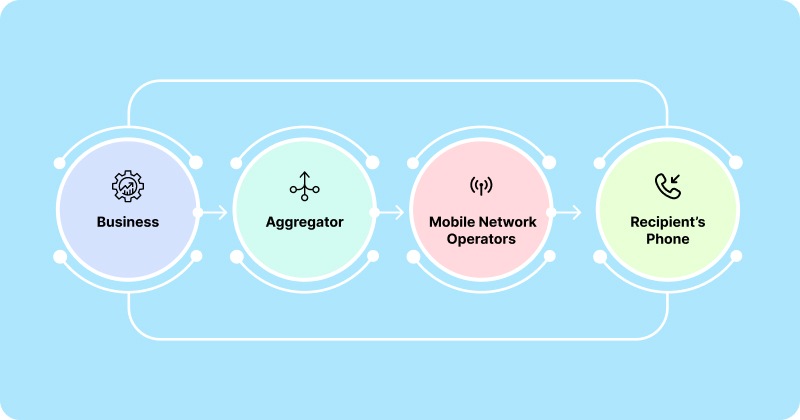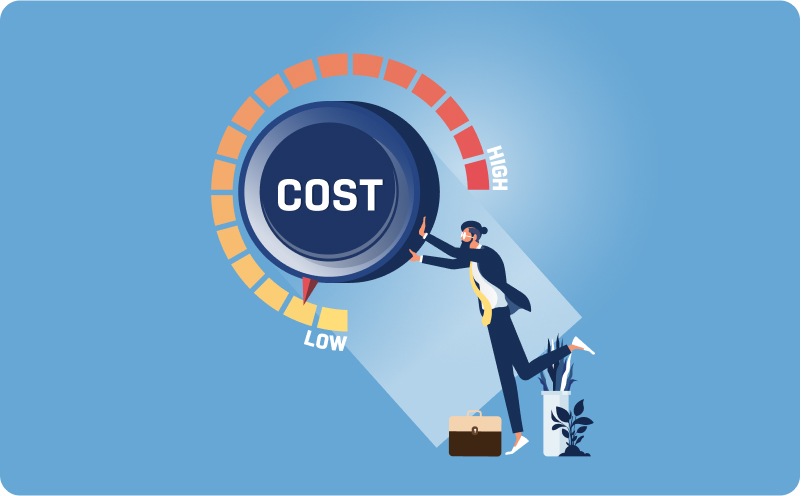
When a person sends a text message to someone, usually it appears that it’s a one-step process. However, in the background, a lot of things happen. One critical role is that of SMS aggregators, who act as intermediaries between businesses and carriers for delivery of the messages to consumer’s mobile devices. Through this blog, we are going to understand why SMS aggregators are called so, their role in SMS delivery in-depth, and how you too can become an SMS aggregator.
What is an SMS Aggregator or a Text Aggregator?
First, let’s understand the terminology.
SMS stands for Short Message Service. It’s a technology that allows mobile phone users to send and receive text messages. The message could be personal, promotional, informational, etc. Text messages follow a certain format and have a 160-character restriction.
SMS has a 98% open rate, which is much higher than email’s 20–30%. Also, 78% of consumers prioritize text messaging over other phone activities. We all are familiar with text messages and have been using them for ages, right?
SMS Aggregator: Defining the Role

The term ‘aggregator’ refers to someone who collects or gathers information from multiple sources. In the context of SMS, an SMS aggregator is a company that collects SMS messages from businesses and routes them to the right mobile carrier network for delivery. SMS Aggregators usually specialize in aggregating (handling) large volumes of text messages. They have agreements with multiple telecom companies and carriers, enabling businesses or brands to send messages via wireless carriers cost-effectively and efficiently.
How does an SMS Aggregator Work?
SMS aggregators work in the middle of the SMS delivery process acting as bridges between businesses and carriers. Let’s understand the flow of SMS delivery to see where and how they work.
- Business Integrates to an Aggregator
When a business connects with an aggregator, they are usually provided an API i.e. Application Programming Interface, which they integrate with their systems such as a CRM. Often, this comes with a user-friendly interface that businesses can use to upload contact lists, compose text messages with ease, and send bulk SMS campaigns.
- Message Processing
A business sends an SMS campaign using the API or SMS platform provided by the SMS aggregator. The aggregator receives the SMS campaign details and starts determining the best route for its delivery to the destination considering the target phone numbers.
Here, it is important to note that aggregators have direct connections with multiple MNOs. This helps them ensure that text messages are delivered through the shortest and most appropriate paths.
Some important points to understand the role of SMS aggregators are:
- Aggregators use smart algorithms to find the fastest and most reliable routes for delivering messages. If one route is down or congested, the system will automatically switch to another.
- SMS aggregators make sure that messages comply with local regulations, such as opt-in requirements or limits on promotional messaging.
- Often, aggregators select routes based on cost efficiency, which can vary depending on regions, time of day, or network conditions.
- Aggregators charge businesses based on the number of messages sent. Also, costs can vary depending on the destination and the type of route used (e.g., direct routes might be more expensive but faster and more reliable).
- Some aggregators offer tiered pricing plans based on message volume, with lower rates for higher volumes.
- MNO/ Carrier Delivery
The aggregator forwards the messages to the MNO or carrier, which then delivers the messages to the mobile devices of the recipients.
- Delivery Reports
Once the message is delivered, the aggregators often provide businesses with detailed reports about the status of the message – delivered successfully, failed, or queued.
Why are SMS Aggregators Important?

Within the mobile ecosystem, SMS aggregators serve as essential elements. Traditional methods of SMS delivery typically involve establishing direct connections, building proprietary platforms, and manual processes. All these methods often require significant technical expertise and infrastructure, which makes them time-consuming, cumbersome, and expensive, especially for businesses that need to send large volumes of text messages.
SMS aggregators emerge as a more cost-effective, scalable, and efficient solution. Without SMS aggregators, businesses will need to maintain individual relationships with telecom providers which could be a much demanding process in itself.
How are Tier 1, Tier 2 and Tier 3 SMS Aggregators Different?
SMS aggregators are classified into different categories or tiers based on their proximity to mobile network operators (MNOs) and the quality of the messaging routes.
-
Tier 1 SMS Aggregators
Tier 1 SMS aggregators have direct connections with wireless carriers. This means Tier 1 SMS aggregators can ensure the fastest or the most direct path for SMS messages i.e. when a company sends messages to its customers. As they offer premium service quality and have direct connections, their rates are usually higher compared to other tiers. Often, businesses prefer sending critical messages messages such as OTPs using Tier 1 aggregators.
-
Tier 2 SMS Aggregators
On the other hand, Tier 2 SMS aggregators, also known as sub-aggregators, are the ones who do not have direct connections with carriers. Rather, they have contracts with Tier 1 aggregators or third parties to send and receive messages.
This means that your messages have to hop 1 or multiple times before reaching the carriers that handle message distribution and delivery. Often businesses that run marketing campaigns and want affordability use tier 2 aggregators.
-
Tier 3 SMS Aggregators
This category of aggregators usually relies on multiple layers of intermediaries. This is the reason tier 3 aggregators are considered the least reliable. Their services are extremely low-cost but come with risks such as delayed messages, failed delivery, and compliance issues. Also, they might not provide businesses with the status of the messages or delivery reports. Businesses use tier 3 aggregators for low-priority bulk SMS messaging.
Here’s a table highlighting the key differences between Tier 1 SMS aggregators and Tier 2 SMS aggregators.
| Feature | Tier 1 Aggregators | Tier 2 Aggregators | Tier 3 Aggregators |
| Market Reach | Global reach, serving large enterprises | Regional or national reach, serving mid-market businesses | Local or niche reach, serving small businesses |
| Network Connectivity | Direct connections to multiple carriers | Indirect connections through other aggregators | Limited network connectivity |
| Service Offerings | Comprehensive suite of services, including A2P SMS, P2P SMS, MMS, and more | Core SMS services with limited additional features | Basic SMS services, often focused on P2P messaging |
| Reliability and Uptime | High reliability and uptime, with robust infrastructure | Moderate reliability and uptime, with less robust infrastructure | Lower reliability and uptime, with limited infrastructure |
| Pricing | Competitive pricing, often offering volume discounts | Slightly lower pricing compared to Tier 1 | Extremely lower pricing |
| Customer Support | Dedicated customer support teams, with 24/7 availability | Limited customer support, often with longer response times | Basic customer support, with limited availability |
| Security and Compliance | Strict adherence to industry standards and regulations | Moderate adherence to industry standards and regulations | Limited adherence to industry standards and regulations |
It makes complete sense to always prefer using tier 1 SMS aggregators, though you might have to pay a little more for their services. However, remember that tier 2 and tier 3 aggregators use grey routes and do not offer reliability, ultimately costing you more.
SMS Gateways and SMS Aggregators: Key Differences
SMS aggregators and SMS gateways are important components of the SMS delivery process and are often considered the same, however, their roles are different.
What is an SMS Gateway?
SMS gateways are messaging platforms or applications that connect with MNOs for sending and receiving SMS messages. In other words, SMS gateways are software solutions or the underlying infrastructure upon which SMS aggregators (who act as traffic managers) rely as they facilitate SMS message delivery.
Let’s delve into the differences:
| Feature | SMS Gateway | SMS Aggregator |
| Definition | A software or hardware solution that enables computers to send and receive SMS messages over telecommunication networks. | An organization that aggregates large volumes of SMS messages from businesses and distributes them to mobile carriers for delivery. |
| Role | Acts as a bridge between computer systems and mobile networks. | Acts as an intermediary between businesses and mobile network operators. |
| Scale | Typically handles smaller volumes of messages. | Handles large volumes of messages. |
| Carrier Connections | May have direct connections to a few carriers. | Has direct connections to multiple carriers. |
| Features | Basic SMS sending and receiving functionalities. | Offers advanced features like delivery reports, two-factor authentication, and marketing campaigns. |
| Cost | Lower cost for smaller volumes. | Higher cost for larger volumes, but often offers better pricing for bulk messaging. |
| Complexity | Simple to set up and manage. | More complex to set up and manage. |
| Best Suited For | Small businesses with low to moderate messaging needs. | Large businesses with high messaging volumes and complex requirements. |
How Do Businesses Work Directly with SMS Aggregator Companies?

Suppose you are an e-commerce website and want to increase customer engagement through SMS campaigns. Here’s how as a business you can typically work with SMS aggregator companies:
1. Partner Selection
As the first step, a business researches and identifies some reputable SMS aggregator companies. While shortlisting the best ones, factors like pricing, features offered, reliability of the aggregator, and customer support services are considered. Often, they request demos and proposals to evaluate the offerings of the SMS aggregator.
2. Contract Negotiation
Once an SMS aggregator is finalized, a contract is negotiated between the two parties which usually outlines the terms of service, pricing, SLAs (Service Level Agreements), etc. Other important aspects like data privacy, security, and dispute resolution are also covered here.
3. API Integration
Here comes the real part: The SMS aggregator’s API is integrated into the business’s system or application, enabling it to send and receive SMS messages.
4. Message Creation and Sending
Now, the business creates SMS messages using the aggregator’s platform or API and makes use of various features such as customized sender IDs, templates, scheduling, etc.
5. Monitoring and Reporting
The business can now track the delivery status of SMS messages using the aggregator’s reporting tools. By analyzing metrics like delivery rates, click-through rates, and conversion rates, future campaigns can be optimized.
How to Become a Reliable Text Aggregator?

Let’s discuss a business opportunity – becoming a text aggregator. As the demand for SMS communication continues to grow, capitalizing on the global messaging market by becoming an SMS aggregator seems to be a lucrative opportunity. By doing so, you position yourself in a high-demand market where you can serve businesses in multiple industries. Working with some high-volume clients can help you reap a consistent revenue stream.
To become a reliable text aggregator, consider the following:
1. Set Up A Robust Infrastructure
A robust infrastructure is the bedrock upon which a successful business is built. Therefore, invest in a reliable and scalable infrastructure to handle high volumes of SMS traffic. Do not ignore the importance of implementing redundancy and failover mechanisms to ensure uninterrupted service.
2. Make Strong Partnerships
Establish strong partnerships with multiple mobile network operators (MNOs) to ensure wide coverage and reliable delivery. This will be your key to reaching out and serving a broader audience while minimizing service disruptions.
3. Excellent Customer Support
Provide exceptional customer support to assist businesses with their SMS messaging needs. Make sure to offer timely technical support and troubleshooting assistance to your clients.
4. Transparent Pricing
Offer competitive pricing plans and transparent billing practices. When clients have clear information about fees, charges, and additional costs, they are more likely to stick with your services.
5. Compliance and Security
Always adhere to industry regulations and data privacy standards. A lot of sensitive data gets transmitted through SMS messages. Therefore, you should implement robust security measures to protect such information.
Like every business out there, becoming an SMS aggregator is a lucrative business opportunity that offers significant profits. However, it also comes with challenges like navigating regulatory compliance, managing technical infrastructure, and staying competitive in the rapidly-evolving market.
REVE SMS – A Comprehensive Solution for SMS Aggregators
REVE SMS Platform is an all-in-one solution designed specifically for SMS aggregators. It offers seamless integration and advanced features to optimize bulk messaging services. With its robust API, user-friendly interface, and global connectivity, our platform enables aggregators to efficiently manage SMS traffic across multiple mobile networks.
REVE SMS ensures high-quality delivery, scalability, and real-time reporting, making it an ideal choice for businesses looking to provide reliable, cost-effective messaging services to their clients. Whether for transactional, promotional, or notification messaging, REVE SMS Platform supports aggregators in delivering superior performance and service quality.
Bottom Line
By partnering with a reliable SMS aggregator, businesses can streamline their communication processes, enhance customer engagement, and drive business growth. If you are considering starting an SMS aggregator business, then our industry experts can help you with all the information you need. Do you have a question or ready for a quick demo of our product? Let us know here.
Frequently Asked Questions
Can SMS aggregators handle International SMS messages?
Yes, SMS aggregators have a vast network of connections with carriers which makes it possible for them to process global text messages.
How is SMS pricing calculated?
There are various factors considered for calculating the pricing of SMS messages including the number of messages, destination country, and the type of message (promotional, transactional, etc.).
Is there any hidden cost associated with SMS messaging?
Hidden or additional costs associated with SMS messaging include international roaming charges, extra fees for premium features, etc.
What are SMS delivery reports?
SMS delivery reports provide insights about the status of an SMS message i.e. whether it was successfully delivered, failed, or queued.
Are SMS aggregators responsible for managing the content of SMS messages?
No, content is created by the business sending messages to its audience. However, aggregators may flag SMS content that they find inappropriate or violate carrier rules.






















